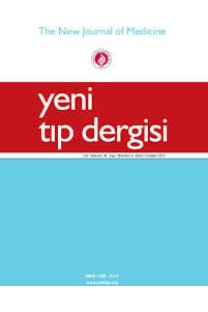Obezite ve Gastrointestinal kanser ilişkisi
The relationship between obesity and gastrointestinal cancer
___
- 1. Nieves DJ, Cnop M, Retzlaff B, Walden CE, Brunzell JD, Knopp RH, et al. The atherogenic lipoprotein profile associated with obesity and insulin resistance is largely attributable to intra-abdominal fat. Diabetes 2003; 52(1):172-9.
- 2. Kanai H, Tokunaga K, Fujioka S, Yamashita S, Kameda-Takemura KK, et al. Decrease in intra-abdominal visceral fat may reduce blood pressure in obese hypertensive women. Hypertension 1996;27(1):125-9.
- 3. Otake S, Takeda H, Suzuki Y, Fukui T, Watanabe S, Ishihama K, et al. Association of visceral fat accumulation and plasma adiponectin with colorectal adenoma: Evidence for Participation of Insulin Resistance. Clinical Cancer Research 2005;15;11(10):3642-6.
- 4. Sellers TA, Kushi LH, Potter JD, Kaye SA, Nelson CL, McGovern PG et al. Effect of family history, body-fat distribution, and reproductive factors on the risk of postmenopausal breast cancer. N Engl J Med 1992;14;326 (20):1323-9.
- 5. Petridou E, Mantzoros C, Dessypris N, Koukoulomatis P, Addy C, Voulgaris Z. Plasma adiponectin concentrations in relation to endometrial cancer: A case-control study in Greece. The Journal of Clinical Endocrinology & Metabolism 2003;88(3):993-7.
- 6. Stattin P, Lukanova A, Biessy C, Soderberg S, Palmqvist R, Kaaks R, et al. Obesity and colon cancer: does leptin provide a link? Int J Cancer 2004;109(1):149-52.
- 7. WHO Obesity: Preventing and managing the global epidemic. Report of a WHO consultation on obesity. Geneva, June 1997. Geneva: World Health Organisation, 1998 HO/NUT/NCD/98:1.
- 8. Donohoe CL, Pidgeon GP, Lysaght J, Reynolds JV. Obesity and gastrointestinal cancer. British Journal of Surgery 2010;97:628–42.
- 9. Kopelman PG. Hormones and obesity. Bailliere’s Clinical Endocrinology and Metabolism 1994;8(3):549-75.
- 10. Tilg H, Moschen AR. Adipocytokines: mediators linking adipose tissue, inflammation and immunity. Nat Rev Immunol 2006;6:772–83.
- 11. Kern PA, Di Gregorio GB, Lu T, Rassouli N, Ranganathan G. Adiponectin expression from human adipose tissue relation to obesity, insulin resistance, and tumor necrosis factor expression. American Diabetes Association. Diabetes 2003;52(7):1779-85.
- 12. Wei EK, Giovannuchi E. Fuchs CS, Willett WC, Mantzoros CS. Low plasma adiponectin levels and risk of colorectal cancer in men: A prospective study. Journal of the National Cancer İnstitude 2005;9:22.
- 13. Komninou Despina, Ayonote Alexis, Richie John P, and Basil R. İnsulin resistance and its contribution to colon carcinogenesis. Experimental Biology and Medicine 2003;228(4):396-405.
- 14. Adachi Y, Lee CT, Coffee K, Yamagata N, Ohm JE, Park KH et al. Effects of genetic blockade of the insulin-like growth factor receptor in human colon cancer cell lines. Gastroenterology 2002;123(4):1191-204.
- 15. Payer J, Jackuliak P, Nagyová M. Obesity and a risk of carcinoma. Vnitr Lek 2010;56:1082-7.
- 16. Bugianesi E: Steatosis, the metabolic syndrome and cancer. Aliment Pharmacol Ther 2005;22: 40-3.
- 17. Chow WH, BlotWJ, Vaughan TL, Risch HA, Gammon MD, Stanford JL et al. Body mass index and risk of adenocarcinomas of the esophagus and gastric cardia. J Natl Cancer Inst 1998;21;90(2):150-5.
- 18. Welzel TM, Graubard BI, El-Serag HB, Shaib YH, Hsing AW, Davila JA, et al. Risk factors for intrahepatic and extrahepatic cholangiocarcinoma in the United States: a population-based case–control study. Clin Gastroenterol Hepatol 2007;5(10):1221-8.
- 19. Li D, Morris JS, Liu J, Hassan MM, Day RS, Bondy ML, et al. Body mass index and risk, age of onset, and survival in patients with pancreatic cancer. JAMA 2009;24;301(24):2553-62.
- 20. Keku TO, Lund PK, Glako J, Simmons JG. Insulin resistance, apoptosis and colorectal adenoma risk. Cancer Epidemiol Biomarkers Prev S 2005 ;14(9):2076-81.
- 21. Hamoudi WTY, Dumitrascu DL. Is there an association between coronary heart disease and colorectal carcinoma? Results from a pilot study. Rom J Gastroenterol 1997;6:13-16.
- 22. Moore LL, Bradlee ML, Singer MR, Splansky GL, Proctor MH, Ellison RC. BMI and waist circumference as predictors of lifetime colon cancer risk in Framingham Study adults. Int J Obes Relat Metab Disord 2004;28(4): 559-67.
- ISSN: 1300-2317
- Yayın Aralığı: 4
- Başlangıç: 2018
- Yayıncı: -
Pediatrik servikal intramedüller anaplastik astrositom olgusu ve kısa derleme
Nilüfer Yalındağ ÖZTÜRK, Erdinç CİVELEK, Ayşe ÖZKUL, Tufan CANSEVER, Serdar KABATAŞ, Cem YILMAZ
HANDAN CAN, Şebnem SOYSAL, Seda TAN, İlker ERCAN, ELMASTAŞ Banu DİKEÇ
Travma ve bağımlılık sendromlarI
İlknur İnegöl GÜMÜŞ, Önder SÜRGİT, MELAHAT YILDIRIM, Ser p SİMAVLI, Mikdat BOZER
Ahmet KARABULUT, Kadir TOPÇU, Bülent UZUNLAR, Mahmut ÇAKMAK
Obezite ve Gastrointestinal kanser ilişkisi
Gerçek ve potansiyel saçlı deri defektleri
Mehmet Oğuz YENİDÜNYA, Onur SERİN, Ali Özgür KARAKAŞ, Murat UÇAK
Giardiasis ilişkili protein kaybettiren enteropati
NİLDEN TUYGUN, Emine POLAT, Selim GÖKÇE, Gonca YILMAZ, Can Demir KARACAN, Aysel YÖNEY
Yanık yoğun bakım ünitesinde santral venöz kateterizasyon deneyimlerimiz
Ogilvie sendromu yaşlı hastalarda ciddi morbidite ve mortaliteye sebep olmakta mıdır?
Bülent KAYA, Nuriye Esen BULUT, Orhan BAT, Mehmet OKUDUCU, Hasan ALTUN, Kemal MEMİŞOĞLU
